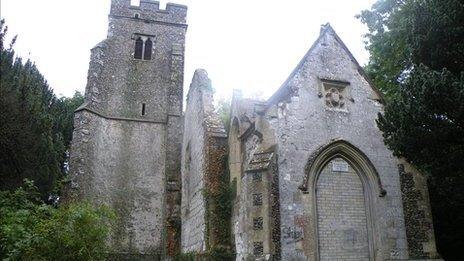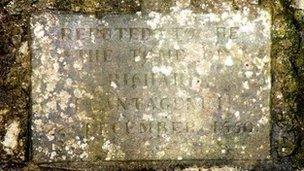Is a son of Richard III buried in Eastwell in Kent?
- Published

The remains of a son of Richard III are thought by some to be at St Mary's Church in Eastwell
Following the discovery of the final resting place of Richard III in Leicester, there are calls for similar work to be carried out to determine if his illegitimate son is buried in a Kent churchyard.
In the grounds of St Mary's Church in Eastwell, near Ashford, is a tombstone for Richard Plantagenet.
The owners of a Kent church say there are no plans to excavate the area, but modern-day testing procedures may be able to determine if it is the grave of Richard III's son.
According to local stories, the young Richard was taken to his father's tent on the night before the Battle of Bosworth in 1485.
His father is said to have pledged he would be cared for no matter what happened.
Reader of Latin
Richard III was killed the following day and buried under what is now a car park in Leicester.
His son is believed to have ended up at Eastwell as an elderly man, and worked for Sir Thomas Moyle, the lord of the manor, as a gardener and bricklayer.
The parish records showed Richard died in 1550 at the age of 81.
St Mary's Church is now derelict and owned by the Friends of Friendless Churches.
In the graveyard is a tomb with the inscription: "Reputed to be the tomb of Richard Plantagenet".
Using DNA
Experts from the University of Leicester were able to match DNA taken from the bones found under the car park to a living relative of Richard III's sister.
Now Councillor Winston Michael, who represents Eastwell and Boughton Aluph on Ashford Borough Council, said he wanted DNA profiling to be used in an attempt to establish who is in the graveyard.
"There is a lot of mystery surrounding the story."

Richard III's son is thought to have worked as a carpenter or bricklayer
He said he has been in contact with University of Leicester about the grave asking them if they would be interested in carrying out work on the site.
"This is a fantastic opportunity to put this myth to bed, one way or another."
Matthew Saunders, from the Friends of Friendless Churches, said there were no specific plans to excavate the site.
"Now we've got the DNA references [from Richard III] we could see if this legend is true. There's good reason to believe there is substance to it.
"It's very plausible and we know Richard had illegitimate sons.
"It would endorse a local legend that has been around for a very long time."
- Published7 February 2013
- Published5 February 2013
- Published4 February 2013
- Published22 October 2010